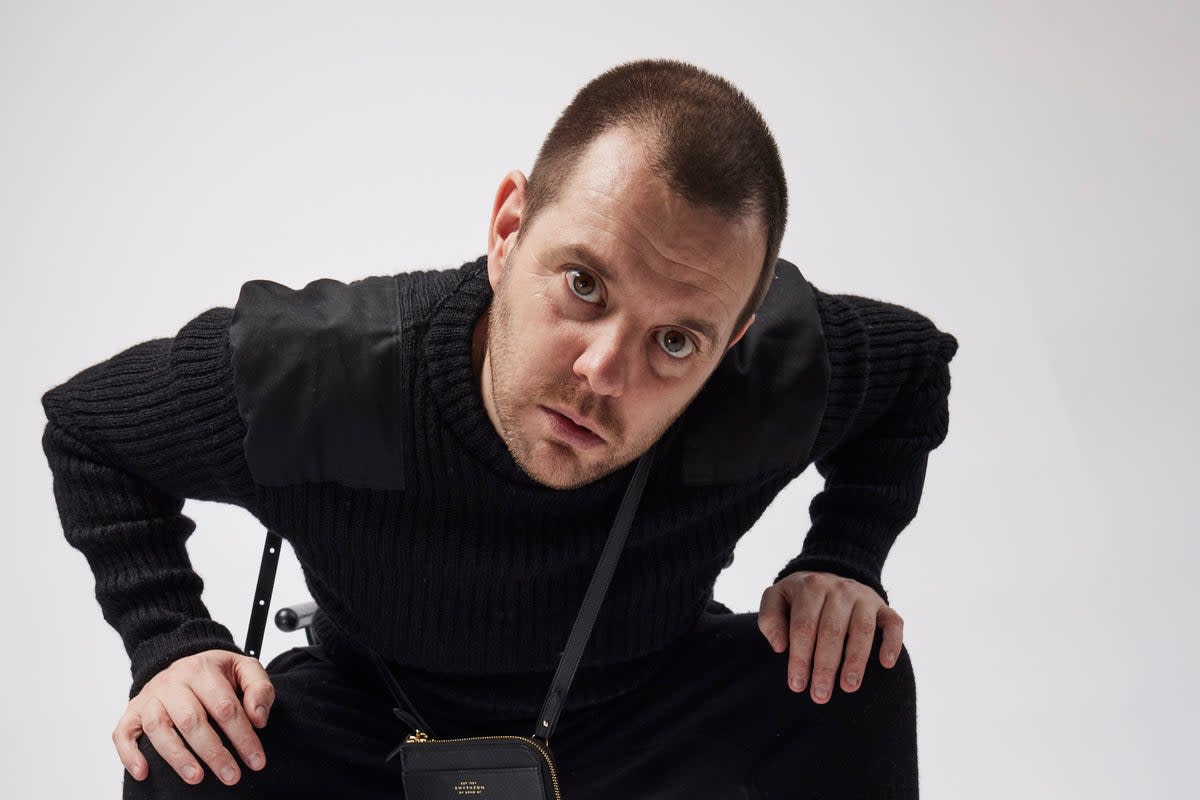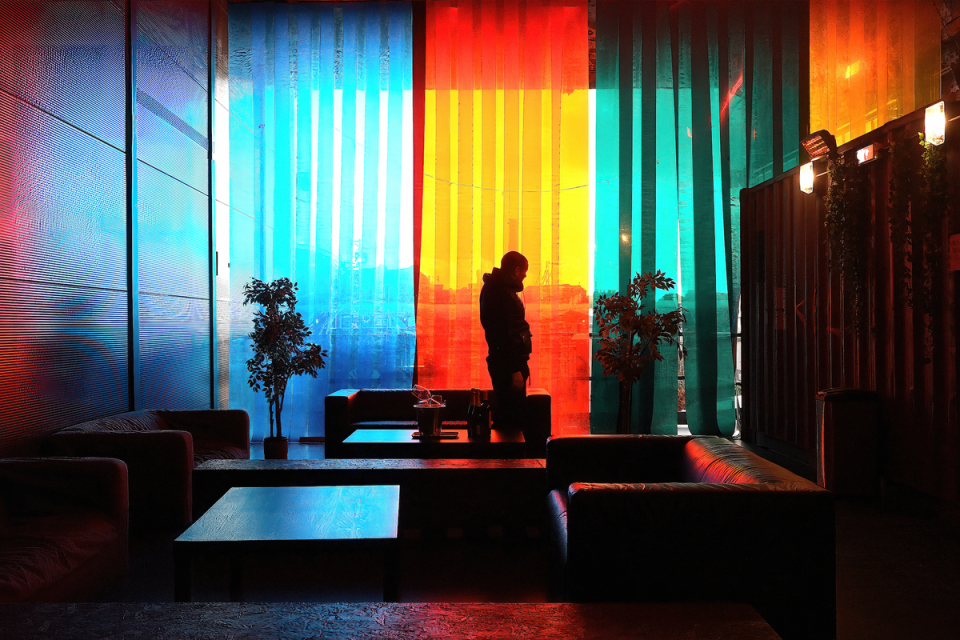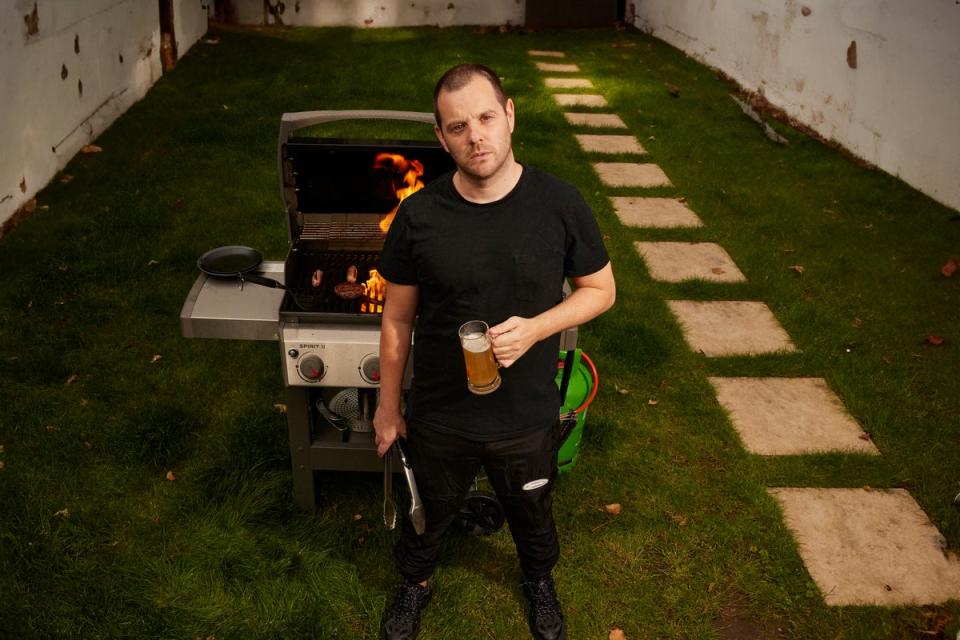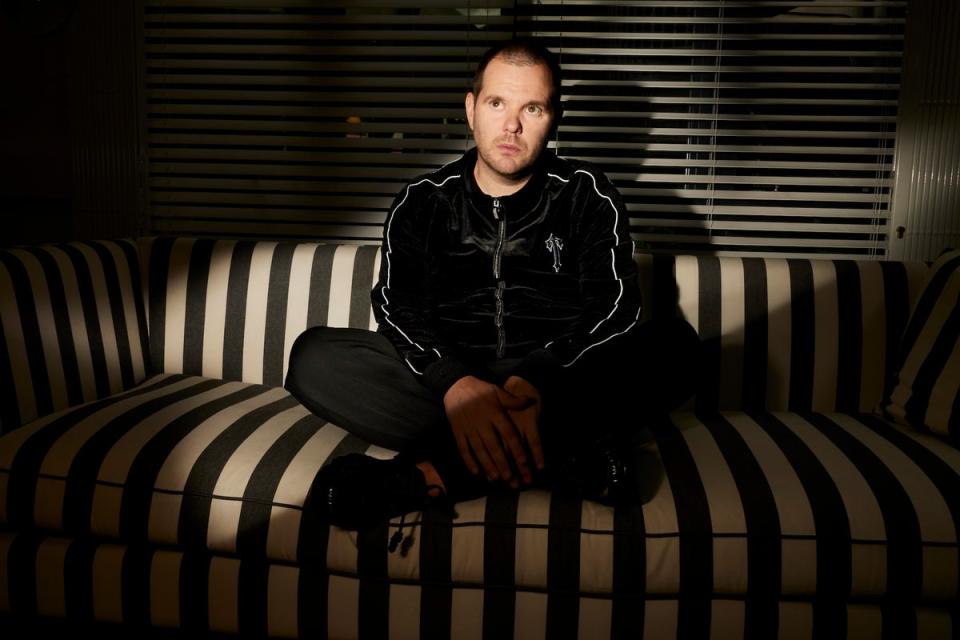The Streets’ Mike Skinner on his film debut and mental health struggles: ‘My life became incredibly traumatic. I wouldn’t want to do that again’

- Oops!Something went wrong.Please try again later.
By the time he retired The Streets in 2011, Mike Skinner nearly had it all: a family, an iron-plated musical legacy and, in the heartbreak anthem “Dry Your Eyes”, a surprise hit so huge that he could live off the royalties. But one dream eluded him. After conjuring a cinema of the everyday on his two landmark albums, 2002’s Original Pirate Material and 2004’s A Grand Don’t Come for Free, he fantasised he would one day shoot a feature film.
Twelve years later – and more than 100 grand out of pocket – the quixotic everyman has written, directed, edited and acted that fantasy into reality. The result is The Darker The Shadow, The Brighter The Light, a noirish odyssey born out of the most challenging decade of his life, when he emerged from The Streets’ first act and the aftermath of a serious gambling addiction. The film’s protagonist, a mid-level DJ also named Mike Skinner, is coaxed into an underworld of shady clubland honchos, presenting the chance to change his fortunes with a risky side hustle or to turn detective and solve the case of a fishy nightclub death.
And now, a week after the premiere, here is the real Skinner, bleary-eyed on a Zoom call and already sick to death of his decade-long project. “It was the hardest thing I’ve ever done by a long, long way,” he admits, his tired gaze flitting across the ceiling of his home in north London. “There’s a part of me that was…” he searches for a phrase that won’t sound melodramatic, then gives up. “It was triggering to watch it.”
So he didn’t. Skinner ducked out of the premiere, prowled the streets for a bite to eat and thought about anything but the movie that almost consumed him. “The great thing about screenings is that you introduce the film, say hi to everyone and then you’ve got exactly 90 minutes to go and have dinner before answering everyone’s questions.” He raises a sardonic eyebrow. “I’m hoping to maybe introduce that model into DJing.”
In conversation, Skinner, 44, combines amused fatalism with a livewire mind that mirrors the extremes of his music – his evolution from the early records’ geezer bard to his subsequent mix of social commentary and barstool philosophy. He laces thoughts on craft with familiar Skinnerisms, often backing a valid observation – “the bad guy in a story should have almost as good a point as the protagonist” – with a head-scratching example: “The powerful thing about Star Wars was that Darth Vader almost had a point. If the dark side are gonna win, why not join them, eh?”
The 90-minute film, which comes with a new Streets album of the same name, shows little regard for realism, offsetting gritty street scenes with stagey artifice. Its protagonist makes one bad decision after another but cannot resist petitioning friends and associates with endearingly earnest aphorisms (“People who flee from a kiss always leave a forwarding address,” goes a typical example). The Skinner character is at a professional crossroads: to keep plugging away or to risk it all for ill-gotten riches. As Skinner puts it, “Do you crack on with the things that you love or do you try to get smart? My character realises that getting smart – particularly as a DJ – means doing the thing that gets you up in the morning.”
For Skinner himself, that motivating project became the film. “I’ve had a real clarity to what I do for years now. It’s easy for me to say that, because ‘Dry Your Eyes’ pays my mortgage, but I really don’t care.” He says he already sees his two children – Amelia, 14, and George, 12– reckoning with social pressures. “When you’re younger, it’s all about what your friends think of you. As you get away from that, you stop caring what anyone thinks. The film – I couldn’t give a f*** what anyone thinks of it, because I’ve made my peace. I’ve sort of given up.”
Spending 10 years on a film doesn’t sound like giving up, I tell him. “But it’s funny,” he says, “now I’ve finished the film, I’m not thinking about the film any more. As you get older, you realise the destination is actually quite empty. I mean that with anything. Dreaming about getting the new car is the best bit about getting a new car. Once you’ve got the car, it’s only downhill from there.”

In his early twenties, the new car was fame. Skinner was catapulted into celebrity when second album A Grand Don’t Come for Free spawned a pair of hits: the lads-on-tour shoutalong “Fit but You Know It” and, thanks to the unlikely patronage of radio DJs like Chris Moyles, “Dry Your Eyes”. Skinner concedes that “Fit but You Know It” and its playful chauvinism might raise eyebrows now, but says society’s moral compass is always in flux.
“If you look at film in the Seventies, it was wild, but then the Eighties was very safe. Obviously, it’s a cheap shot, but when they cancelled that old song” – he means “Baby It’s Cold Outside”, which John Legend rerecorded in 2019 after replacing lyrics suggestive of date rape – “that very week the No 1 song was [Cardi B and Megan Thee Stallion’s salacious rap anthem] ‘WAP’ [Wet Ass P****]. We’re in a very sex-positive place and we’ve got a certain set of values.” Still, he says, “I love those Seventies movies. Revenge movies like Dirty Harry remind us that social justice isn’t just one direction. If you want to ‘clean up the streets of New York’, that’s basically racist, isn’t it – you end up like Dirty Harry. But I’m a bit older and I’m able to see that the world has changed for the better. We should be embracing how mad it used to be, saying, ‘Isn’t it good that the world’s changed?’”
All pop music is essentially old Black music. You can’t be under any illusions about that
At the height of his fame, Skinner used his pop bona fides to champion Black artists like The Mitchell Brothers, whom he signed to his label The Beats. Did he feel a responsibility, as a white rapper, to do so? “I think you can go back a long way – all pop music is essentially old Black music,” he says. “You can’t be under any illusions about that… and honesty is very important to me.” He contends that “in rap music, it’s harder to get in the door if you’re white but once you’re in the door... there’s a higher ceiling”, though he suspects that may finally be changing.
The Streets’ own commercial heyday waned with third album The Hardest Way to Make an Easy Living, which documented his spiral into a tabloid-abetted identity crisis. In reality, Skinner’s mental health struggles were compounded by the sudden deaths of his dad, aunt and niece in quick succession; around the same time, he lost tens of thousands of pounds spread-betting on football. That period was “incredibly traumatic”, he says. “I wouldn’t want to do that again. Which seems crazy – being in the charts, being in the newspapers…” He stops himself, wary of indulgence. “I like the Noel Gallagher attitude: it’s your job to show the next generation that it’s amazing being a creative. Stop complaining and take your mental collapse like a proper rock star.”

The Hardest Way to Make an Easy Living sold a disappointing 700,000 copies to its predecessor’s 3 million. Why does he think his later albums performed relatively poorly? “I mean, it’s obvious. When you stop living in the same world as everyone else – it happens to every musician that becomes successful – they don’t understand their audience. … The smart thing to do would have been to keep writing A Grand Don’t Come for Free, but I’ve never been cynical. Not once. And I am really proud of that.”
Though he was diagnosed with chronic fatigue syndrome around 2010 – and compares filmmaking to “creative solitary confinement” – this latest project never quite plunged Skinner into the paralysis and anxiety of his 20s and 30s. “I don’t have the feeling of being watched all the time any more, which is great. On my second or third album, you’d walk in somewhere and people would start talking about you. You didn’t know what people were going to do.”
I’ve never been cynical. Not once. And I am really proud of that
On a directorial level, The Darker The Shadow, The Brighter The Light sometimes feels amateurish, but in such a way that sympathetic viewers will overlook its flaws and connect with a character who seems plucked wholesale from a Streets song. With his main prior experience being a handful of music videos, Skinner picked up an impressive skill set on the hoof, including lighting, 3D graphic design and a slightly awkward feel for editing.
By far the most eccentric feature is his emotionless acting. He has talked down his performance, claiming that, by the time he was in front of the camera, he had nothing left to give. (“I’ve got so much to think about I couldn’t give a f***,” he told Loud and Quiet magazine.) But his offbeat style has an uncanny charm – I ask if he was so self-deprecating in order to forestall criticism. “The one thing I really don’t like is overacting. I think it’s a bit indulgent. I feel really strongly that I’m just telling a story. The whole thing’s fake. I wrote it all down and I got people to come and say the words out loud. An amazing performance on screen is, fundamentally, someone’s ability to hide their emotions.” I am wondering if I follow, but he peels ahead. “I mean, Hitchcock didn’t have Oscar-winning performances. It wasn’t about the acting; it was about the story. Same as Kubrick in a lesser sense. I’m more into that.”
Inspired by detective novelists like his beloved Raymond Chandler, the script follows a noir tradition in which a “death is bigger than a death”, Skinner says. “That’s a classic Chinatown-type thing, where it’s not about a body in a canal; it’s about the water supply to LA” For Skinner, the “big bad” was property development: the way political and commercial forces quietly erode pleasure-providing nightlife industries. He blames our failure to prevent club closures on party politics’ imperative to appease the voter base. “Dance music is a new art form, newer than ballet and opera. So we don’t have legions of old people who are members of the Conservative Party saying, ‘We must save this incredible dubstep venue in New Cross.’”

Economic discourse around music and politics should, more broadly, be reframed, he adds. “This isn’t my social justice thing, but I think putting a price value on British music is the wrong way to go about it. Because actually, British music is soft power. When you go to Spain and you see someone wearing a Vivienne Westwood punk outfit, that’s soft power. I don’t expect the government to care about British music, but I do think we’re sort of doing their job in a way.”
On debut single “Has It Come to This?”, Skinner spun a slice-of-life chronicle glamourising people often stereotyped, under aspirational political orthodoxy, as layabouts and yobs. How does he feel about the vanishing social safety net for those who embody the “sex, drugs and on the dole” ethos? “We’ve got a lot to figure out in this country, and I think it’s something that we all have to take part in,” he says. “Hopefully Labour will get in, but even when Labour get in, there’s an awful lot to talk about.”
America is getting to the point where they’re realising that the president is just a celebrity – and I think they’re OK with that
Such as? “When suffrage was widened – not just to women, to all working people – there was a debate about whether the people even know how the country should be run. And I think we’re still answering those questions now. America is getting to the point where they’re realising that the president is just a celebrity – and I think they’re OK with that. That’s the biggest question: is democracy just celebrity, and what does that mean?”
Skinner, for his part, is glad to be clear of his own bout with celebrity. He now lives with his wife, the jewellery designer Claire Le Marquand, and the kids – a far cry from his wild years amid the 2000s indie and dance underworlds. “I just hated the whole thing, to be honest,” he says of the sleazier side of that era. “The sooner I could sit at home and just drink tea, the better. I’m really glad I’m in a family now and can just lie in bed.” And with a wry smile, the rapper, producer, DJ, actor and filmmaker Mike Skinner logs off to resume the business of being a dad.
Feature film and album ‘The Darker The Shadow, The Brighter The Light’ is out now via 679 Records and Warner Music UK

